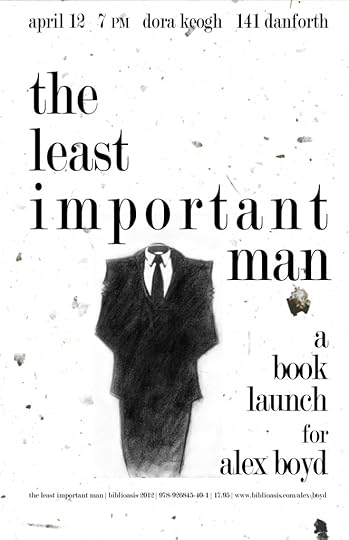Alex Boyd's Blog, page 11
May 19, 2012
Iris Murdoch: The Sea, The Sea
I’m not sure how I’ve gone so long without reading Iris Murdoch, but she’s a remarkable novelist. I’d like to reproduce a scene that’s both terrific writing, and demonstrates the ability of a novel to get inside a character’s head and put the reader inside an experience the way film (as much as I love it too) simply can’t. There isn’t a name in this passage, but as the whole book is narrated by one person, it’s still a bit of a bit of a spoiler for one event in the novel, thought the whole book is an engaging read, and this quote spoils nothing else. The narrator has just been suddenly pushed from a cliff edge into the sea:
“As I am writing this story it will be evident that I survived, and I cannot hope to convey what the experience was like, how long it was, how terrible, how hopeless: a primal experience of a total loss of hope. Falling, what the child fears, what the man dreads, is itself the image of death, of the 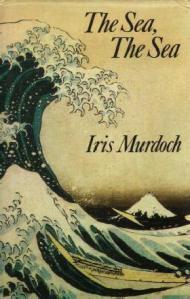 defencelessness of the body, of its frailty and mortality, its absolute subjection to alien causes. Even in a harmless fall in the road there is a little moment of horror when the faller realizes that he cannot help himself; he has been taken over by a relentless mechanism and must continue with it to the end and be subject to the consequences. ‘There is nothing more I can do.’ How long, how infinitely expansible, a second is when it contains this thought, which is the effigy of death. A complete fall into the void, something which I had often imagined on aeroplanes, is of course the most terrible thing of all. Hands, feet, muscles, all the familiar protective mechanisms of the body are suddenly useless. The enmity of matter is unleashed against the frail breakable crushable animal form, always perhaps an alien in this hard mineral gravitational scene.
defencelessness of the body, of its frailty and mortality, its absolute subjection to alien causes. Even in a harmless fall in the road there is a little moment of horror when the faller realizes that he cannot help himself; he has been taken over by a relentless mechanism and must continue with it to the end and be subject to the consequences. ‘There is nothing more I can do.’ How long, how infinitely expansible, a second is when it contains this thought, which is the effigy of death. A complete fall into the void, something which I had often imagined on aeroplanes, is of course the most terrible thing of all. Hands, feet, muscles, all the familiar protective mechanisms of the body are suddenly useless. The enmity of matter is unleashed against the frail breakable crushable animal form, always perhaps an alien in this hard mineral gravitational scene.
It was as if each part of my body experienced its separate despair. My back and waist felt the dreadful imprint of the hands which with great sudden violence and indubitable intent propelled me over the edge. My hands reached out in vain for something to clasp. My feet, still touching the rock with which they were parting company, jerked in a weak useless spasm, a last ghostly attempt to retain balance. Then they were jerking in empty space and I was falling head downward, as if my head and shoulders were made of lead. At the same time I felt, or thought of as a kind of final thought, the fragility of my head and even knew that my hands were now trying to protect it. My trunk twisted sickeningly, trying in vain to make sense of its position. I actually saw, in the diffused midsummer darkness-light, the creamy curling waves just below me, and the particular spiral of their movement in the confined space. Then I was in the water whose intense cold surprised me with a separate shock, and I made the instinctive swimmer’s movement of trying to right myself; but my body was aware that no swimming could take place in that vortex. I felt as if my neck were breaking as I looked up to see a dome of dark faintly translucent green, the wave above me. I was choking and swallowing water, absorbed in the one task of getting another breath. At the same time I was able to think: this is the end. I fought, my whole body fought, now flailing senselessly in a maelstrom of powers which seemed about to dismember me. Then my head struck violently against the smooth rock and I lost consciousness.”








May 7, 2012
NPR update: Amanda Jernigan and Liz Worth interviews, reviews and poetry
Northern Poetry Review is updated with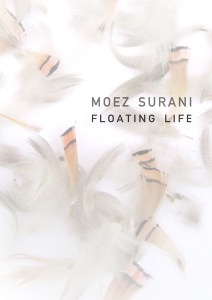 a poem by Moez Surani from his new book Floating Life.
a poem by Moez Surani from his new book Floating Life.
There’s also an interview with Amanda Jernigan by Carmelo Militano, as well as a second interview with Liz Worth by Natalie Zina Walschots.
Lori A. May looks at The Best Canadian Poetry in English, 2011.
Ingrid Ruthig reviews two books together: Sunday the Locusts by Jim Johnstone and Proofs & Equatorial Love by Jason Guriel and Shane Neilson.








May 2, 2012
One Question Interview: Mark Callanan
God is a definite presence in Gift Horse, though it’s hard to find swift justice here. God seems to have created the world and let it run away on its own, like a watchmaker who has nothing more to do with the final product. There are many fine moments, but I was particularly struck by “The wolf, as always, is just doing a job.” Could you elaborate on this?
I think that god is more of a palpable absence in the book than an actual presence—which, paradoxically, makes him omnipresent. I was raised in a devout Roman Catholic household (my father was—for years before his marriage and my subsequent birth—a priest), and so the idea of god as an active force in the world was central to my childhood. I’ve since broken faith with the church; I don’t
 believe in god. And yet—call it the product of indoctrination or of niggling doubt—on some level I wish I did believe because I see how faith in higher power gives strength to others in trying times; there’s great comfort in believing that, no matter what happens, a kind and benevolent force is looking down on you, one that will never desert you in your time of need. Being a combination of romantic and pragmatist, I’ve found that I’m constitutionally incapable of believing in god, but wish I did because it seems to me that life would be easier if I had faith. I don’t, and so the central conflict of my character is this opposition between reason and wishful thinking.
believe in god. And yet—call it the product of indoctrination or of niggling doubt—on some level I wish I did believe because I see how faith in higher power gives strength to others in trying times; there’s great comfort in believing that, no matter what happens, a kind and benevolent force is looking down on you, one that will never desert you in your time of need. Being a combination of romantic and pragmatist, I’ve found that I’m constitutionally incapable of believing in god, but wish I did because it seems to me that life would be easier if I had faith. I don’t, and so the central conflict of my character is this opposition between reason and wishful thinking.“The Meaning of Life” addresses this idea. The kite line figures as metaphorical connection to the divine, but in the end of the poem, I’m holding a line gone slack—the kite having crashed back to earth. In a related reference, the “Lord of St. Francis” from the poem “The Wolf of St. Francis” is “a tough bitch / of a wolf” who “Licked her lips / at Francis’ every faltering step / as her nostrils drank / the scent of blood inside him”—which is an inversion of our traditionally patriarchal and anthropomorphic conceptions of god. God, in that poem, is really just a hungry animal hunting weakened prey. The line about the wolf “just doing a job,” which you quoted from “Medieval Woodcut,” reinforces this notion: Despite our historic demonizing of wolves as bloodthirsty sadists, they’re really only responding to basic needs for survival, they’re answering to instinct. And we’re no different, despite our inflated sense of our own importance. We’re just animals (my three-year-old son is currently fascinated by this thought)—dominant because of our ability to generate adaptive technologies, but still animals that eat, shit, fuck, and die. This may seem like a bleak outlook, but I don’t consider it so. We’re part of something larger than ourselves, which is not god but the long and varied history of life on this planet. When we die, we’ll feed more life; we’re little pieces of the cosmos. There’s something beautiful in that.








March 8, 2012
Launch: The Least Important Man
February 26, 2012
One Question Interview: Rishma Dunlop
Rishma Dunlop is an award-winning writer, and a Professor of English and Creative Writing at York University in Toronto. Her writing includes poetry, essays, fiction and translation, and editing work includes Red Silk: An Anthology of South Asian Canadian Women Poets. Her radio drama, "The Raj Kumari's Lullaby," was commissioned and produced by CBC Radio in 2005. She has written five books of poetry, most recently Lover Through Departure: New and Selected Poems.
These are haunting poems inhabited by a strong sense of place, and places containing the echoes of people ("Bistro chairs capable of playing Mozart") even as people are occupied by memory. Is that fair to say, and could you elaborate on what motivates this feeling in the poems?
Yes, the poems in Lover Through Departure are haunted by a sense of place. Place, for me, is a defining limit and desire for permanence. I'm fascinated by the way human memory is contained in homes, architecture, cities, and landscapes. Places themselves are commemorative of trauma and wounds as 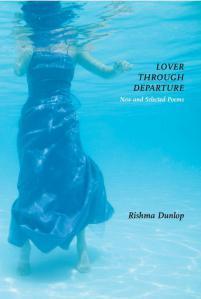 well as joys and daily life. Sometimes, place even becomes the remembrance of a home that never was, or an ephemeral promise, edged with violence and destruction. In this sense, places are a mnemonic form of shelter, asylum, or an idealized resting place, a beloved native land, or a war zone—in which birthing, living, warring, praying, dreaming, and dying, all take place.
well as joys and daily life. Sometimes, place even becomes the remembrance of a home that never was, or an ephemeral promise, edged with violence and destruction. In this sense, places are a mnemonic form of shelter, asylum, or an idealized resting place, a beloved native land, or a war zone—in which birthing, living, warring, praying, dreaming, and dying, all take place.
Human lives are only given permanence and presence in those places we are able to consecrate, and commemorate. Cities themselves are beloved places in my poems; some are even named as such, as in "Still Life," in which the Slovakian capital city of Ljubljana is named, not only for its musicality, but also because the word means "Beloved."
"Touch has a memory," Keats reminds us, and in that sense, my poems become a kind of tactile recollection of a particular image, or moment, or essence. I am interested in the relational, the particular, the political, the horrific, and in poetry's ability to give voice to the way external landscapes become expressions of consciousness—mindscape, memoryscape, dreamscape. Realism passes over to mythic vision that suggests sacred meaning and ritual. My poem "Birth of a City," for example, is based on the ancient rituals through which an augur "inaugurated" the site of a city. After the site of a city was determined by the flight patterns of birds, the augur announced the three names required for every city to be consecrated:
The priestly, first, where trees meet the water.
The public's then, to gather in the meeting place,
And the secret, sacred name, Fortitude.
Places become humanized, acquiring character from our projection of human stories and the embodied psychology of a person or a people. For me, the rendering of place in poetry is an invention of rhetoric, a reading against the conventional literature that claims the primary "reality" of place and its influence on the literary imagination. In "Paris," as you note, bistro chairs are "capable of playing Mozart." I set out to capture how we can feel and think "through cities, through maps and grids, buildings and sculptures, the concentric circles of arrondisssments. … places on public statues where the patina has been rubbed shiny by passing hands…."
In some of my poems, place is a central omphalic point, a hub from which I draw the primary rhythms of the living world. There are two ways of sensing a place, as Seamus Heaney notes in his essay "The Sense of Place:" "one is lived, illiterate and unconscious, the other learned, literate and conscious." Place, for me, is never a static object finished in time, nor some geographer's pause in motion; it is the site from which time flows and the site that offers humans a regeneration of time when it is returned to or thought of as a sacred place. "The ancestors are still there," in my poem "Ancestors," "echoing across the hillside stations and their railways / across the bloodied border of Kashmir and / the births of midnight's children."
In this omphalic sense, place has the power to redeem the returning consciousness by chiasmus or cross-linkage. This is also prevalent in "Metropolis Redux:"
In the empty theatres of the city, small productions are played out. Rain-slicked streets. Stories of charred roses, bones of mishap. A star plummets and a soul is exiled. In the storm of dreams, the cup of sleep. A doorway haunted by an open hand…
This place is not where she began. But here, her body has spilled blood and water, emptying towards the future….The city gives her voice, something singular chosen out of chaos.
These particular images, or my memories of them, inscribe themselves in my poems as emotive impulses. But my understanding of the role places play in our lives is also deeply rooted in a sense of beauty, both philosophical and aesthetic, a beauty that no doubt has its shadow, and its dark side. This sensibility is found in the way human psyches and bodies imprint themselves on architecture and the arts, but also on oceans, lakes, rivers, houses, cities. In the end, the poem is the record that haunts me and endures:
"—the poem that will not hold its tongue —refuses to shut its scarlet mouth."








February 11, 2012
Pulphead: Essays
It's as enjoyable as it is reassuring to discover an excellent book of essays like this one. Enjoyable because Sullivan is an engaging writer who collects interesting magazine work here, and reassuring to see books like this are still published, marketed, bought and read. The book begins with "Upon This 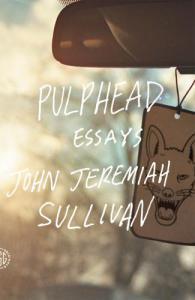 Rock," as Sullivan spends a few days at a Christian rock festival. The youth he meets could have been dismissed or parodied, but Sullivan is a more thoughtful writer than that, taking the time to try and illustrate them. Some of his other topics (reality TV stars and well-fed, angry conservatives are among them) would have been similarly easy to harpoon, but also get a more fleshed-out portrayal. In the world of these essays, people are complex, slightly sad, and possibly misleading themselves in some way. Sounds like someone I know. Wait, sounds like humanity.
Rock," as Sullivan spends a few days at a Christian rock festival. The youth he meets could have been dismissed or parodied, but Sullivan is a more thoughtful writer than that, taking the time to try and illustrate them. Some of his other topics (reality TV stars and well-fed, angry conservatives are among them) would have been similarly easy to harpoon, but also get a more fleshed-out portrayal. In the world of these essays, people are complex, slightly sad, and possibly misleading themselves in some way. Sounds like someone I know. Wait, sounds like humanity.
There's a great moment I reread several times in "Mr Lytle: An Essay." As a young man, Sullivan lived with and helped care for an elderly writer, Andrew Lytle. "About once a day he'd say, 'I may do a little writing yet, myself, if my mind holds.'" Sullivan describes taking a sneak look at a single sentence Lytle left on his typewriter and finding it a stunningly smooth, perfect sentence that captured a moment of horror suddenly transformed into joy. "What he could still do, in his weakness, I couldn't do. I started listening harder, even when he bored me."
It isn't enough to call it an overall theme for the collection, but several of the essays – "Unnamed Caves" and "Unknown Bards" – involve the incredible flukes of chance that go into the destruction or preservation of culture. In the second of the two, Sullivan participates in the process of trying to research and preserve some of the earliest blues recordings. He details a remarkably rare 78 found at a yard sale of some kind by a collector (what are the odds of that?), but the record was so warped it looked like a bowl. By pure chance, the collector was the sort of person who knew what to do: "He took it home and placed it outside between two panes of clear glass – collector's wisdom, handed down – and allowed the heat of the sun and the slight pressure of the glass's weight slowly to press it flat again, to where he could play it."
Sullivan is a skilled writer, which makes it a little frustrating he sometimes works unnecessarily hard to be appealing to the reader. For the sake of adding charm, he includes the false starts and backtracking that comes with conversation (Guns N' Roses "were grotesque and crass and stupid sometimes, even most of the time. Even almost all of the time"). But a writer that's already perceptive, interesting and accessible doesn't need to do that. If you can make language sit up and dance, you don't need to give any thought to how much the reader likes you. It's most noticeable at the end of an essay on increasing reports of animal violence worldwide. The reports are disturbing and numerous: Elephants are killing higher numbers of people and are now raping rhinoceroses, "something that is evidently just as startling to zoologists as to the layperson." The stories go on: a pack of 200 dogs worked together to attack a town in Albania, and even "attacks of dolphins on humans are noticeably up."
It seems likely that increased animal anxiety – not to mention shockingly coordinated attacks on humans – suggest early warning signs we're overpopulating the planet to the point that nature itself is fighting back. It's all fascinating and alarming stuff, but the essay is given the unfortunate, somewhat flippant title "Violence of the Lambs," and Sullivan works very hard to get the reader to laugh it off at the end, creating a comical scenario of all-out war between humans and animals. But it's the moment to suggest we change our ways and stop encroaching on animal territory, not the moment for a verbal tap dance to amuse the reader. Sullivan seems to want to distance himself from the potential seriousness of his own essay.
But ultimately, these are niggling concerns, given that the reader frequently sails along with Sullivan's engaging prose without distraction. And as Pulphead has already had a number of very positive reviews, perhaps a second collection from Sullivan will take a somewhat more unapologetic tone.








January 15, 2012
NPR update: Sachiko Murakami, Leigh Kotsilidis and more
Northern Poetry Review is updated with poems by Sachiko Murakami from  her new collection Rebuild, and Ingrid Ruthig interviews Leigh Kotsilidis following the publication of her book Hypotheticals.
her new collection Rebuild, and Ingrid Ruthig interviews Leigh Kotsilidis following the publication of her book Hypotheticals.
There are three new reviews: I've reviewed Open Air Bindery by David Hickey, Jacob McArthur Mooney reviews Richard Outram: Essays on his Work, and Jim Johnstone reviews A Page from the Wonders of Life on Earth, the new book by Stephanie Bolster.
I'm also very glad to welcome Jacob McArthur Mooney and Ingrid Ruthig to the site as editors. Along with Alessandro Porco and Lori A. May, that makes for a crack team of open-minded, articulate folks.
On a different note, may I suggest now is a good time to subscribe to Canadian Notes & Queries, both to start the year supporting a fiercely honest Canadian literary magazine, and because the next issue will have an essay of mine and three poems from my forthcoming book, The Least Important Man.








January 7, 2012
One Question Interview: Chris Banks
Chris Banks is the author of three books of poetry: Bonfires (2004) won the Jack Chalmers Award for poetry and was shortlisted for the Gerald Lampert Award, The Cold Panes of Surfaces (2006) and most recently Winter Cranes.
These are carefully crafted, meditative poems and while they're very rewarding they do much more than simply lead to reassuring places or record beauty. There's the suggestion "even patience can be a kind of violence," even as old people wage a battle with their bodies "so full as they are of old griefs and consolations." If anything, the book strikes me as cataloging some of the dangers and pitfalls of having a complex inner life. Could you elaborate on that?
There is a poem by the American poet Stanley Plumly called "Lazarus at Dawn" which has a beautiful first line,"Your whole life you are two with one taken away." That idea or feeling is why I need 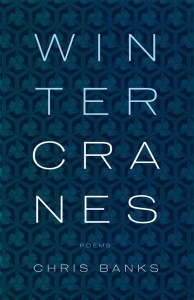 imagination and poetry in my life. Most often I want to attach myself to the world, to wholly belong in it and to be part of it, in a way that is quite simply not possible.
imagination and poetry in my life. Most often I want to attach myself to the world, to wholly belong in it and to be part of it, in a way that is quite simply not possible.
I say this because it is our separateness that makes every person unique, the world both surprising and extraordinary; and, in fact, what creates that powerful sense of attraction we feel towards people and things in the first place (because they are so different from us), but it is also a constant source of unfulfillment.
When I first conceived of doing Winter Cranes, I wanted to write a collection that dealt with the whole litany of experience—despair, loss, and insatiable longing, especially that particular emotion—which comes with living. But I didn't want it to come out as some sort of manifesto either where these ideas took precedence over the images. Rather, I wanted these ideas to inhabit or to haunt the interiority of any new poems.
As people, we make from that cataloguing as you called it a kind of myth or mask that says this is our identity. This is who we are.
However, a problem arises when we pay too much attention to the inner chatter of the mind, it can lead to self-seeking and isolation from other people. Thankfully poetry has taught me to mind the gap. My imagination looks for resemblances and correspondences and suddenly a connection between what is happening in my mind and what is on the outside is satisfied for a moment, and there is a feeling of transcendence.
It is the same reason some people offer up daily prayers. People never pray just once. They pray often, sometimes multiple times a day, for it is prayer which creates a connection to something larger than themselves, restoring a sense of calm and inner equilibrium, and thus helps them to live their lives.
Writing poetry and reading poetry does something similar for me. Each helps me to live by breaking down the barriers that exist between myself and the world at large, and in the process, real or imagined, my life is made whole.








December 27, 2011
Year in Review: 2011
New this year: fatherhood, which is three syllables for a remarkable experience that still requires adjustments, both minor and more significant. At the same time, I wouldn't trade my daughter's smile for anything. I've written about the experience in an essay I hope to see published someday. It's a 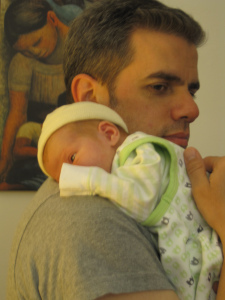 strange thing to feel at once more confident about my place in the world and more vulnerable with worry about her. At the same time, I'm occasionally overwhelmed and yet more appreciative of smaller things than ever.
strange thing to feel at once more confident about my place in the world and more vulnerable with worry about her. At the same time, I'm occasionally overwhelmed and yet more appreciative of smaller things than ever.
Favourite non-fiction book of the year: Finding the Words (anthology) features some very articulate Canadians speaking in a loosely themed way around the craft of fiction. I've started enjoying Best Canadian Essays 2011, where new series editor Christopher Doda and guest editor Ibi Kaslick have done great work.
Short stories: the Penguin Selected Stories of Maupassant, which collects some remarkable, simple stories that nevertheless manage to capture deeply perceived ideas about people.
Favourite novel: again, a classic will eclipse some very fine recent books, but I finally caught up with the white whale Moby Dick and thoroughly enjoyed it, particularly once I adjusted to the idea that the plot wouldn't move quickly and began to luxuriate in the language and ideas. It builds to a completely gripping final few chapters that are actually over far too quickly without — surprisingly enough — necessarily touching on all the characters.
Favourite reruns: I revisited The Day of the Triffids. Also, I continue to rediscover the Sherlock Holmes stories by Arthur Conan Doyle, even as the character enjoys a surge in popularity, both in film and in the excellent new BBC series Sherlock.
Favourite graphic novel: Two Generals, a Canadian Second World War story that mixes major historical events with real family history to provide a fascinatingly detailed story.
Films: True Grit (2010) is from last year, but I finally caught this slightly warped, engaging, beautifully crafted film, and went out to buy the score too. Night Train to Munich (1940) is perfect, black-and-white Saturday afternoon viewing. The biggest disappointment of the year was Green Lantern (2011) which felt overwritten, and bland.
Favourite new musical discovery: Duke Ellington, and in particular Reminiscing in Tempo, among the first longer jazz pieces, and dedicated to his mother after she passed away. Ellington was devastated for months, and then wrote this quietly beautiful 12-minute piece. For more recent artists, Julia Kent is a new discovery of mine. If you haven't heard of the show (for the "musically curious") there's a lot to be discovered on CBC's The Signal.
Special mention — I spent three weeks squirrelled away in an office with the baby while my partner took on a job, and managed to read excellent collections of stories by a trio of Canadians: Rebecca Rosenblum, Carolyn Black and Jessica Westhead.








November 12, 2011
The Least Important Man and other news
I'm very glad to say Biblioasis books will be publishing my second book of poems, The Least Important Man, in the spring of 2012. They're a fine press doing really great work,  so I feel quite honoured and look forward to seeing the book. Is it spring yet?
so I feel quite honoured and look forward to seeing the book. Is it spring yet?
In other news, this photo is not simply my impression of Kenneth Branaugh in Hamlet, it's my attempt to participate in Movember, in support of cancer initiatives. I thought I'd provide the link to the donation page here as part of an effort to avoid emailing people to death.
Please consider a donation. I'm only $5 behind one guy on my team. And more importantly, it's a very good cause.









